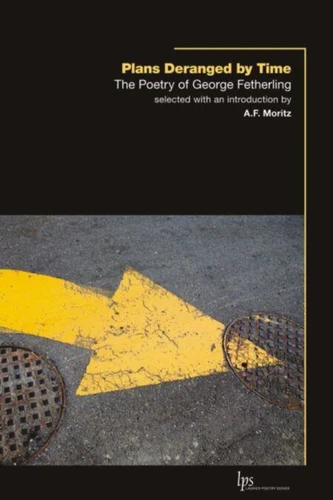Plans Deranged by Time. The Poetry of George Fetherling
Par : ,Formats :
Disponible dans votre compte client Decitre ou Furet du Nord dès validation de votre commande. Le format ePub est :
- Compatible avec une lecture sur My Vivlio (smartphone, tablette, ordinateur)
- Compatible avec une lecture sur liseuses Vivlio
- Pour les liseuses autres que Vivlio, vous devez utiliser le logiciel Adobe Digital Edition. Non compatible avec la lecture sur les liseuses Kindle, Remarkable et Sony
 , qui est-ce ?
, qui est-ce ?Notre partenaire de plateforme de lecture numérique où vous retrouverez l'ensemble de vos ebooks gratuitement
Pour en savoir plus sur nos ebooks, consultez notre aide en ligne ici
- Nombre de pages82
- FormatePub
- ISBN978-1-55458-649-3
- EAN9781554586493
- Date de parution01/05/2012
- Protection num.Digital Watermarking
- Taille2 Mo
- Infos supplémentairesepub
- ÉditeurWilfrid Laurier University Press
Résumé
The Toronto Star called him a legendary figure in Canadian writing, and indeed George Fetherling has been prolific in many genres: poetry, history, travel narrative, memoir, and cultural studies. Plans Deranged by Time is a representative selection from many of the twelve poetry collections he has published since the late 1960s. Like his novels and other fiction, many of these poems are anchored in a sense of place-often a very urban one.
Filled with aphorism and sharp observation, the poems are spare of line and metaphor; they display a kind of elegant realism: loading docks, back doors of restaurants, doughnut shops with karate schools upstairs. In the introduction, A. F. Moritz places Fetherling in the modern picaresque tradition in the aftermath of Eliot and Pound, highlighting his characteristic speaker as an itinerant cosmopolitan outsider, a kind of flâneur, impoverished and keenly observant, writing from a position of "communion-in-isolation." He contrasts Fetherling's contemplative intellectualism with that of the public intellectual and highlights this outsider's fellow-feeling, making the poems indirectly political.
Fetherling's afterword is an anecdote-anchored exploration of what the poet sees as his two central approaches-"the desire to create new codes of hearing" and "writing-to-heal"-and how they are reflected in the collection.
Filled with aphorism and sharp observation, the poems are spare of line and metaphor; they display a kind of elegant realism: loading docks, back doors of restaurants, doughnut shops with karate schools upstairs. In the introduction, A. F. Moritz places Fetherling in the modern picaresque tradition in the aftermath of Eliot and Pound, highlighting his characteristic speaker as an itinerant cosmopolitan outsider, a kind of flâneur, impoverished and keenly observant, writing from a position of "communion-in-isolation." He contrasts Fetherling's contemplative intellectualism with that of the public intellectual and highlights this outsider's fellow-feeling, making the poems indirectly political.
Fetherling's afterword is an anecdote-anchored exploration of what the poet sees as his two central approaches-"the desire to create new codes of hearing" and "writing-to-heal"-and how they are reflected in the collection.
The Toronto Star called him a legendary figure in Canadian writing, and indeed George Fetherling has been prolific in many genres: poetry, history, travel narrative, memoir, and cultural studies. Plans Deranged by Time is a representative selection from many of the twelve poetry collections he has published since the late 1960s. Like his novels and other fiction, many of these poems are anchored in a sense of place-often a very urban one.
Filled with aphorism and sharp observation, the poems are spare of line and metaphor; they display a kind of elegant realism: loading docks, back doors of restaurants, doughnut shops with karate schools upstairs. In the introduction, A. F. Moritz places Fetherling in the modern picaresque tradition in the aftermath of Eliot and Pound, highlighting his characteristic speaker as an itinerant cosmopolitan outsider, a kind of flâneur, impoverished and keenly observant, writing from a position of "communion-in-isolation." He contrasts Fetherling's contemplative intellectualism with that of the public intellectual and highlights this outsider's fellow-feeling, making the poems indirectly political.
Fetherling's afterword is an anecdote-anchored exploration of what the poet sees as his two central approaches-"the desire to create new codes of hearing" and "writing-to-heal"-and how they are reflected in the collection.
Filled with aphorism and sharp observation, the poems are spare of line and metaphor; they display a kind of elegant realism: loading docks, back doors of restaurants, doughnut shops with karate schools upstairs. In the introduction, A. F. Moritz places Fetherling in the modern picaresque tradition in the aftermath of Eliot and Pound, highlighting his characteristic speaker as an itinerant cosmopolitan outsider, a kind of flâneur, impoverished and keenly observant, writing from a position of "communion-in-isolation." He contrasts Fetherling's contemplative intellectualism with that of the public intellectual and highlights this outsider's fellow-feeling, making the poems indirectly political.
Fetherling's afterword is an anecdote-anchored exploration of what the poet sees as his two central approaches-"the desire to create new codes of hearing" and "writing-to-heal"-and how they are reflected in the collection.



